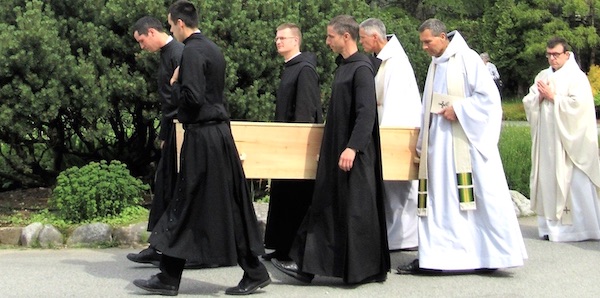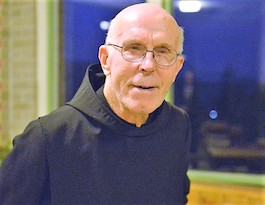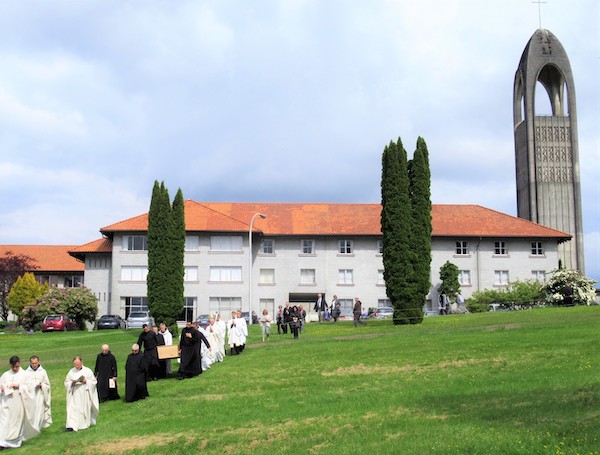An ordinary monk redefined extraordinary
- TERRY O'NEILL
It's been said that you should live your life not to fill your resume, but to fill your eulogy.

In other words, what's important is not what you achieve in your career, but who you become as a person.
This aphorism came to mind last week when I read a 50-word obituary in a daily newspaper about the passing of Brother Maurus de Klerk, OSB, a monk at the Benedictine monastery at Westminster Abbey in Mission. The obituary stated merely that Brother Maurus had, after 63 years of professed monastic life, died May 26 at the age of 91, and that his funeral Mass would be celebrated June 3 by Abbot John Braganza, OSB.
A review of B.C. Catholic files revealed very little about Brother Maurus, but I suspected that, even though there was no record of any recognized achievements, an examination of his life as a monk might uncover something noteworthy. My intuition proved correct, but not in the way I had imagined.
Brother Maurus was born April 22, 1929, in the Netherlands, in the city of Delft. He took vocational training as a gardener and immigrated to Canada in 1954. While visiting Holy Rosary Cathedral the following year, he saw a poster promoting the abbey and its seminary. After a single interview with Abbot Eugene Medved, OSB, in August 1955, he entered the monastery for good.
In a biography released by the abbey, Brother Maurus explained his decision to become a religious brother in simple terms. "The abbey provided me with a family to live with and a structure I was in need of," he is quoted as saying. "Idleness was a great problem for me."
 Brother Maurus de Klerk, OSB
Brother Maurus de Klerk, OSB The biography goes on to say that Brother Maurus felt that if he had remained in the outside word he would have been lost.
I attended his funeral Wednesday, and what I learned is that the world that Brother Maurus found at the scenic, mountaintop abbey was a simple, seemingly mundane life in which he faithfully tended the abbey's 15 flower gardens, tended a weather station, milked cows, cleaned rooms, set tables, peeled potatoes, and performed that most monk-like of duties by working in the abbey library's book-bindery.
A long-time acquaintance of his told me that Brother Maurus had an honest, childlike manner. "I remember the first time I met him," the friend recalled.
"I brought my children up to visit the abbey, and he was the first person we met. And before we could get in and look at all the amazing stained-glass windows, he said, 'I have a beauty to show you.' What we got was a one-hour, unbelievably heartfelt show-and-tell of the garden he had grown. 'Look at this dahlia,' he'd say. 'Look at the colour of this flower.' And he was giddy with the idea. It was very, very sweet."
At a time when material gain, pleasure, and notoriety are the focus of so many people’s lives, the humble and simple Brother Maurus de Klerk was a most extraordinary man.
Abbot John's homily had a similar theme. "There is a joy in every face and every age of man," he said. "It is an attractive beauty because it belongs to Christ but shines through the cracks and traces of love which our humanity can disguise so well … One of Brother Maurus' responses to this perception of beauty was, 'Now dat's a beauty!' He said this of people, of books, of flowers and of events."
Finding beauty in all things, never complaining, being dutiful – the more I learned of Brother Maurus, the more I appreciated how his simple, monastic life seemed to have been wonderfully in tune with the Rule of Benedict, the sixth-century book of precepts for living a communal life written by the Benedictines' founder, St. Benedict of Nursia.
Brother Maurus' life also appeared to epitomize the three vows that all members of the order profess: stability, fidelity to the monastic way of life, and obedience. In other words, he was a successful monk.
Nevertheless, some might be tempted to conclude that Brother Maurus' life was unexceptional and quite "ordinary." They'd be correct if they were referring to ordinary in the sense of its Latin root, which means "rule." For it's certainly true that Brother Maurus lived by the Benedictine Rule.

But I would counter that, at a time when so many people's lives seem so focussed on material gain, pleasure, or notoriety, the humble and simple Brother Maurus de Klerk was a most "extraordinary" man. I would further answer that it takes an extraordinary man with astonishing grace to love and to serve with such faithfulness and humility for so long a time.
Brother Maurus' achievement, then, was the person he became, the devoted brother he was to his fellow monks, and the legacy of his love of God and his fellow man that he now leaves us. And, surely, that's something to celebrate.
 This is Meaghen Gonzalez, Editor of CERC. I hope you appreciated this piece. We curate these articles especially for believers like you.
This is Meaghen Gonzalez, Editor of CERC. I hope you appreciated this piece. We curate these articles especially for believers like you.
Please show your appreciation by making a $3 donation. CERC is entirely reader supported.

Acknowledgement
 Terry O'Neill. "An ordinary monk redefined extraordinary." The B.C. Catholic (June 3, 2020).
Terry O'Neill. "An ordinary monk redefined extraordinary." The B.C. Catholic (June 3, 2020).
Reprinted with permission of the B.C. Catholic.
Photo 1 and 3 Terry O’Neill photos, photo 2 Westminster Abbey.
The Author
Terry O'Neill writes for the B.C. Catholic.
Copyright © 2020 The B.C. Catholic



